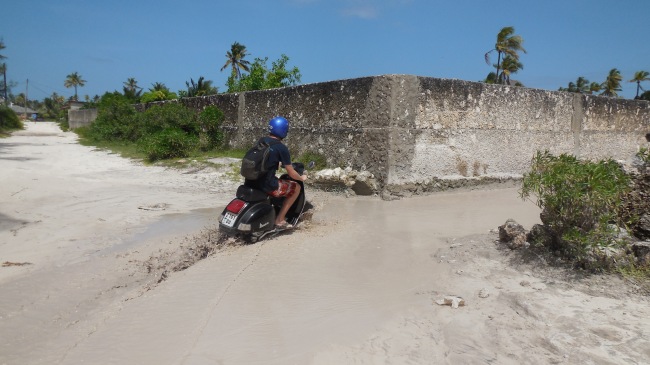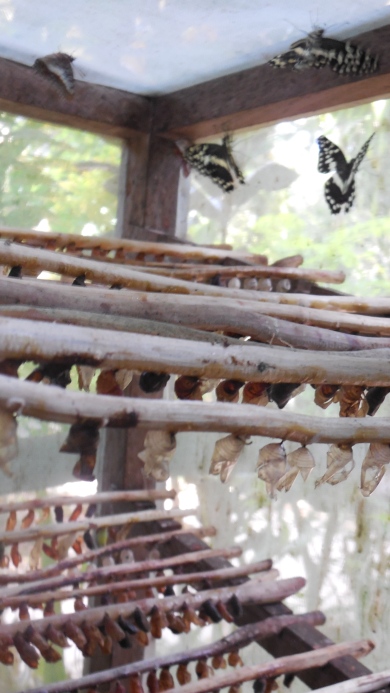Something I’ve noticed about life throughout my experience, is that good luck and bad luck often come hand in hand, all bundled up together, in the same convenient package. That was especially true of my most recent adventure in Bongo-land; so I’ll break it down for you, my recent ups and downs…
Last weekend I set off with 3 other friends for the island of Pemba. Pemba is part of the Zanzibar protectorate, but gets significantly less tourism. It’s known for its pristine reef diving, witch doctors, and flying foxes (very large bats that are indigenous to the island).
The ferry ride to the island was pleasant enough. We slept almost the whole way, despite getting rained on. Once on the island we opted not to take an excessively priced taxi and instead caught a local bus (more like a pick-up truck with benches in the back) to the main town of Chake-chake. Watching beautiful forest scenery fly by from the back of a truck crammed with local men, mothers and children made for a magical, authentic african experience.
Once in Chake-chake we found the hotel we had hoped to stay in was full. Certainly not full of tourists as we were the only foreigners we saw in our time there. Instead we found a place called Tunda lodge, which was essentially a house that had been turned into a small motel. The manager was helpful, and after negotiating a fair price for some time, he showed us a local restaurant / bar for dinner. As we ate rains came down harder and harder. When we tried to make our way back to the lodge we got a bit lost, as the trails we had followed had turned into small rivers. Our clothes soaked and our bellies full, we hoped for sunshine for the next day.
Sure enough, the rains ended early the morning, but our problems increased. We found that the one atm on the island that takes foreign cards was no longer available, and my friends were nearly out of money. We did some calculations and realized if we stayed another night or two, we could not afford the ferry home. Then we learned the next ferry wouldn’t leave for 3 or 4 more days. We had no choice but to fly back to Zanzibar and its atms or be stuck on Pemba, possibly forever. We entertained this idea with some humor, dreaming up the local jobs we could take; sandal fundi (fixer), banana seller, or with some luck dive master. Fortunately a plane company took credit, so we made our reservations for later that afternoon. Miraculously, we were still able to make a journey out to see some flying foxes before our flight.
Arriving safely in Zanzibar was both positive and negative for me. I was sad to have to leave Pemba so soon, before I could dive, or really get to know the place. Yet the familiarity of Zanzibar made it feel almost like coming home, and the abundance of other tourists and places to stay makes it really easy to get around.
We found a guy who rented us motor scooters, and suddenly we were flying all around Stonetown and even up and down the length of the island. The first day we went as far north as Kendwa to see the beautiful beaches. We arrived before sunset, with just enough time to swim a little and eat a nice dinner before making the journey back below the stars. The next day we did two dives at an island offshore from Stonetown. Then we took the scooters south to a village called Paje, where we found a sweet deal on a nice hotel where many Danish students stay.
On our way back we stopped by the Zanzibar Butterfly Center to check out their enclosed butterfly garden. The ZBC hires local farmers to cultivate butterflies, which they then sell overseas to zoos or to farmers as pollinators.
We got back to Stonetown in time to return the scooters, and do a little shopping before we caught the ferry home. My friends got Maasai machetes from a local stall, and I got some super comfortable Muslim pants.
Back in Dar es Salaam is where we ran into some chaos. We passed up the taxis at the ferry port, thinking we’d find a cheaper bajaj. Yet there was no bajaj to be found, and it was getting dark. We stopped on a corner to get some drinking coconuts, and a man started talking to us. He seemed friendly, and after a while he asked where we were going. We told him the university and he said his uncle was a taxi driver who’d be going that way soon. He said he’d take us for 10,000, because it was on the way. It seemed possibly too good to be true, but we agreed to go talk to him anyway.
We were led to the man’s “uncle” and his taxi cab that looked legitimate (it had the stripe and the stickers). We got in, and so did the driver and his friend in shotgun. At this point one of my friends refused to enter. We have heard bad stories about taxis with more than one driver up front. So the driver’s friend got out and let him sit up front, and we felt better about the situation, if still a little iffy.
Immediately upon driving around the corner the taxi ran out of gas, and we had to push it a ways to a pull over zone. The driver asked for the faire up front so he could buy gas. Again we hesitated, but finally paid him and he ran off to get gas. While he was gone we noticed the back doors didn’t open from the inside. But when he got back he was all “hakuna matata” and we were able to roll down the windows, so we could at least open the doors from the outside.
Traffic in Dar is ludicrous, and we were stuck in line for some time. When we asked questions the driver would claim he couldn’t speak much English, but he didn’t answer our inquiries in Kiswahili either. After a while he kept saying he’d take a shortcut. It started out as the same shortcut many bajajis take, so we felt okay with it, but my skeptical friend had growing concerns. Eventually he had taken a few too many turns and we were on a dark, empty road. Then he rolled up the windows. When I asked him why, he said, bad neighborhood.
Now we were all on the edge of our seats. Why did this man take us to a bad neighborhood? And who was it that he kept talking to on his cell phone? Somewhere along the darkest, loneliest dirt road he stopped. We all chastised him instantly, “What are you doing? DRIVE! NOW! Away from here!” Again he was all “hakuna matata.”
He drove to the end of the street, then turned around and came right back down the same street. He tried to say school was just around a few more corners, as if we weren’t aware that he had doubled back on the same road. At the same place he stopped again. We were livid and terrified yelling, “TWENDE! Fucking GO NOW!” Three or four big guys appeared from the side of the road and rushed the car, reaching for the windows and the doors. My friend in the front seat opened his door to hit a guy coming at him and then slammed it. He smacked the drivers leg with the flat end of his machete and yelled “GO NOW!” Finally the driver took off, and we got away safely.
My friends now held their machetes up where they were visible, and we commanded the driver to take us to the nearest busy street. He did, and we promptly got out. He tried to offer to take us the rest of the way, still saying, “hakuna matata.” No we told him, “kuna shida kubwa” and as I walked away the last thing I said to him was “wewe ni mtu mbaya” to which he, of course, replied “mimi sio.”
The point of this story isn’t to raise alarm. We all arrived home safely, even with all of our things in tact. Had things gone the other way, we probably would have been robbed, or possibly taken around to various atms and made to pull out money for them (as had happened to one of my friends here).
The point is there were plenty of warning signs, that we should have taken more seriously. We all knew things weren’t right, yet we went along with it for the sake of getting home quickly. For me, it was a lesson well learned in taxi protocol. For anyone else traveling abroad in places where not all taxis can be trusted, I would simply say this, trust your instincts, if anything feels fishy don’t hesitate to just walk away. There are plenty of drivers out there who will get you where you need to be comfortably, without problems.
Again this situation was one of tremendous good and bad fortune occurring simultaneously. Obviously nearly getting jumped involves a bit a bad fortune, but the fact that we got out of it required a strong dose of good fortune as well.
Finally, before I go I’d like to tell you about arojo. Arojo is a delicious soup sold on the streets of Zanzibar for very cheap prices. You’ll find men behind a grill cooking up mishkake (meats on a stick). You tell them how many mishkake you want, and then they toss them in a bowl with a bunch of potatoes and cover it all in a golden broth. Finally you top it off with a spoonful of pilipili (hot pepper sauce), and then it’s ready to be enjoyed.
Getting to enjoy arojo several times during my stay in Zanzibar was a definite positive. However the negative came along a few days later, as I’ve been sick as a dog since my return. Sick as a dog with loads of foreign bacteria in his gut.
But to end with a final positive, I was able to see a doctor and get some medicine to help me recover quickly.





Whew! Sounds like a close call, but as the Bard said, “All’s well that ends well.” Love, Dad